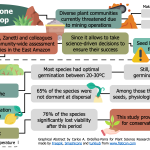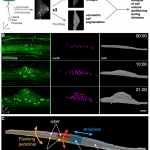Plant roots sense soil compaction through restricted ethylene diffusion (Science)
 Soil is the growth substrate for most plants and contributes to their success through factors such as microbial ecology, chemistry and presence of nutrients, and physical properties including how compact it is. With increasing soil compaction (bulk density), roots are less able to penetrate, resulting in shorter, wider roots; these shorter roots are often less able to reach water and nutrients. Pandey et al. investigated why roots are shorter – is it simply that they cannot exert sufficient penetration force, or are other factors involved? The authors used computed tomography to watch roots grow in wild-type and ethylene insensitive rice. Strikingly, in wild-type plants, exogenous ethylene was sufficient to reproduce the effect of compacted soil, and conversely the ethylene insensitive mutants did not show the stunted phenotype in compacted soil, indicating that root growth is arrested by ethylene rather than mechanical impedance. They next queried the source of this ethylene, to determine if roots upregulate ethylene production when they sense soil compaction. Instead, they found that the increased ethylene response occurs because ethylene cannot diffuse effectively in denser soils, leading to a local increase in concentration. Intriguingly, the authors observe that this mechanism might allow growing roots to sense and avoid regions of high soil compaction. (Summary by Mary Williams @PlantTeaching) Science 10.1126/science.abf3013
Soil is the growth substrate for most plants and contributes to their success through factors such as microbial ecology, chemistry and presence of nutrients, and physical properties including how compact it is. With increasing soil compaction (bulk density), roots are less able to penetrate, resulting in shorter, wider roots; these shorter roots are often less able to reach water and nutrients. Pandey et al. investigated why roots are shorter – is it simply that they cannot exert sufficient penetration force, or are other factors involved? The authors used computed tomography to watch roots grow in wild-type and ethylene insensitive rice. Strikingly, in wild-type plants, exogenous ethylene was sufficient to reproduce the effect of compacted soil, and conversely the ethylene insensitive mutants did not show the stunted phenotype in compacted soil, indicating that root growth is arrested by ethylene rather than mechanical impedance. They next queried the source of this ethylene, to determine if roots upregulate ethylene production when they sense soil compaction. Instead, they found that the increased ethylene response occurs because ethylene cannot diffuse effectively in denser soils, leading to a local increase in concentration. Intriguingly, the authors observe that this mechanism might allow growing roots to sense and avoid regions of high soil compaction. (Summary by Mary Williams @PlantTeaching) Science 10.1126/science.abf3013



